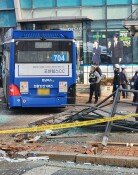Thirty Years of Driving, But Hes Never Seen Times Like These
Thirty Years of Driving, But Hes Never Seen Times Like These
Posted August. 26, 2004 23:32,
It is four in the afternoon on August 24, and he has already been waiting for an hour.
Private taxi driver Park Bum-ryul (55 years old, living at Gyeonggi Goyang City Baeksuk-dong) feels his mouth drying up. He has been waiting in vain for a customer for over an hour in front of the LG Twin Tower at Seoul Yeongdeungpo-gu Yeoido-dong, a good site to pick up customers. Lined up in front and behind him are another 30 taxis waiting for a customer just like Park.
I have been in this business for about 30 years, but the situation has never been as bad as it is nowadays.
Park, whose work schedule revolves around two days of work and one day of rest, works about 19 hours a day and earns about 140,000 won. Deducting 50,000 won for fuel costs, his net profit is 90,000. In other words, he said, If you calculate it, its like earning 4,700 won per hour. Even back in 1998, when the economic crisis was in full throttle, he would earn about 10,000 won in net profit per hour. Now he does not even earn half of that.
Another concern of Park is the amount of driving he does without carrying a customer, which only increases his mileage. Early this year, he could meet his daily income by driving about 220km, but in the present, he has to cover 400km because of how often he drives around without a customer.
Park has acutely felt the crisis since February of this year when his monthly net income plunged to 1.8 million won from an average monthly net income of 2.5 million won just a year ago.
There are many days that I go empty handed because I cant get customers during commuting hours, he said. It was the same precise situation on August 24. Park woke up at a 6 a.m., an hour later than usual. As he blamed himself for waking up late, he quickly grabbed the phone to tell the call-center that he would start working. Park is a member of a call-taxi association, composed of taxi drivers of the Ilsan area.
When can I start picking up customers? asked Park. The call-center operator answered, You have to wait about 50 minutes, about a hundred drivers already asked before you did.
Hence, Park picked up a customer headed to Seoul Jonggak at 6:50 a.m. At this pace it was difficult for Park to pick a long-distance commuter in Seoul. In all, Park earned 25,000 won between the commuting hours of 7 a.m. to 9 a.m. that day. He still has a very long way to go until he reaches his daily goal of 140,000 won. Using his 30-year experience as a taxi driver, he quickly draws up a map in his head, marked with good spots to pick up customers.
After going through the map in his head, he drew a route and timetable that he would follow: 10 a.m. at the Mapo Holiday Inn Hotel, 1 p.m. at Seoul Station, 3 p.m. at Yeoido LG Twin Tower, and 5 p.m. at the Sinchon Hyundai Department Store.
The results, however, were quite discouraging. Every place he went was packed with 20 to 30 empty taxis waiting for customers. During the afternoon I only picked up five customers that were taking only the basic-fare distance, said a frustrated Park.
It was time for office workers to leave work, but even then, customers were rare.
Around 7 p.m. a 30-something woman took a taxi in Myeongdong and said, Nowadays, there are many robbers disguised as taxi drivers, so I am afraid to take taxis at night. In fact, the number of people taking a taxi at night has drastically decreased. There are more taxis than customers when you go to areas that people hang around even after 11 p.m.
At midnight, Park picked up a completely inebriated customer near the Kwangmyung Station of subway line number seven, which was a costly mistake. The drunken passenger refused to pay his fare. After bickering for a while, Park received his fare of 7,200 won, but felt tears in his eyes when seeing a passenger unwilling to pay.
Park has debts after he borrowed from the bank to pay for his daughters university registration fee of 3.09 million won. He even has had to move to a smaller house.
It is almost impossible to live with my monthly income of 1.8 million won. The government often argues that the economy is doing fine, but I just dont understand. I wish the president to know the pain that the working class is going through.
It was past 1 a.m. on August 25, when Park returned home after a whole day of driving. He planned to call the call center at 5 a.m. sharp and start another day of driving just a few hours later.
legman@donga.com



![“설거지해도 그대로”…냄비 ‘무지개 얼룩’ 5분 해결법 [알쓸톡]](https://dimg.donga.com/c/138/175/90/1/wps/NEWS/IMAGE/2026/01/15/133164664.3.png)

![[속보]尹 ‘체포방해’ 1심 징역 5년 선고](https://dimg.donga.com/c/138/175/90/1/wps/NEWS/IMAGE/2026/01/16/133171597.1.jpg)

